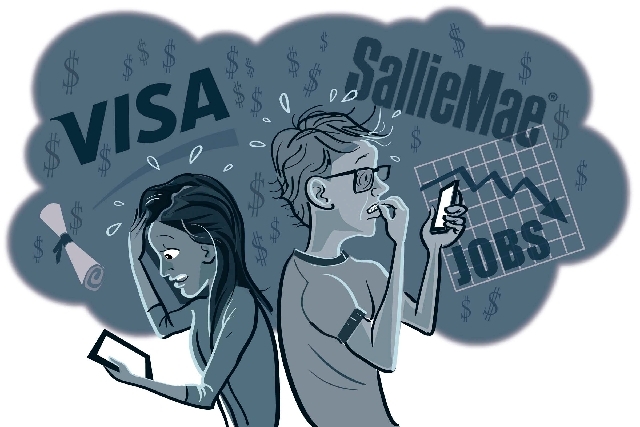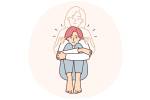20-somethings weighed down with worries often beyond their control
In the fall of 2009, at the height of the recession, the therapists at a counseling center on the University of Nevada, Las Vegas campus were seeing the deteriorating economy take its toll. Worries related to financial stresses were so pervasive among their clients that the staff launched a pilot study to pinpoint exactly what was going on and how to help.
In one particular written observation as part of the research, a therapist described newly unemployed clients like this: “They’re scared. Most of them don’t see a light at the end of the tunnel, and they’re paralyzed by fear and negativity.”
Although the clinic, the Center for Individual, Couple and Family Counseling, serves adults of all ages in the community, perhaps the most telling concerns were voiced by college students and recent graduates. It was as if someone had turned the dial up and 20-somethings were suddenly straddled with the worries of their parents’ generation: job security, savings, debt.
“Usually (employment) wasn’t part of the presenting problem, usually it was more about stress related to school or stress related to their relationships. This was more about, ‘Oh my gosh, what am I going to do? ... I’m graduating with a degree and there’s a real good chance I’m not going to have a job,” said Markie Blumer, assistant professor with the UNLV Marriage and Family Therapy Program and a supervisor at the Center for Individual, Couple and Family Counseling.
“I’ve taught at a multitude of universities now, across the country, and I think the last four or five years I’ve seen this generation of students be much more worried about their future in a very real way than generations in the past,” she said.
In a world of consumerism and market testing, there are plenty of theories to go around about what drives the country’s youngest, most tech-savvy generation of adults known as the Millennials. But, as Blumer has seen, this group is wrapped up in some real concerns.
According to the 2012 results of an ongoing study called Stress in America by the American Psychological Association, adults ages 18 to 47 are reporting the highest level of overall stress.
On a scale of 1 to 10, with 10 representing the highest or “a great deal of stress,” these adults rate theirs at 5.4 on average. The baby boomers, who start at age 48, are next at 4.7, while those 67 and older report an average stress level of 3.7.
When the 2,020 survey participants were asked if they had lain awake at night during the past month because of stress, it was 52 percent of the Millennials, defined as ages 18 to 33, who said “yes,” the highest of any generation. Millennials were also more likely to report that their stress had gone up in the past year and the least likely to feel they are doing a good job managing their stress.
The most common sources of their worries are “work, money and job stability,” followed by relationships and family responsibilities, according to the survey.
It only makes sense, perhaps, that Millennials’ top stress sources are related to financial issues since they are at a point in their lives when they are expected to leave the nest and support themselves. But these have been unusually tough times.
The recent national unemployment rate for those ages 35 and older was less than 6 percent, compared with 7.4 percent for ages 25 to 34, and 13 percent for those ages 20 to 24, according to Gregory Acs, director of the Urban Institute’s Income and Benefits Policy Center. Even when Millennials do find work, he said, many of them will be playing catch-up.
Based on what was seen as a result of the recession of the early 1980s, “we would expect their wages to be noticeably lower even 20 years into the future than they would have been had they been able to start at a time when the unemployment rate was like it was in the mid-2000s or the ’90s,” Acs said.
A study by the Pew Research Center also shows that the share of Americans living in multigenerational family households is the highest it has been since the 1950s. The percentage of those ages 25 to 34 living in a multigenerational household, in fact, has sharply risen since the start of the recession in 2007, hitting 22 percent.
Filmmaker Kris Krainock, who is 23, lives with his mom in Las Vegas and shares the rent and expenses. He had been accepted to the Los Angeles Film School but decided it didn’t make sense to spend $40,000 for one year of tuition, not to mention thousands in living expenses.
Krainock said he has watched some of his friends dial down their career goals because of the uncertainty of the job market and being forced to look at supporting themselves in the short term.
“That’s the biggest thing, is that fewer and fewer friends have lofty goals, they’re more concerned with getting and keeping a job or kind of, you know, the next step, as opposed to ‘my future, my plan,’ or how I’m going to execute that. ... It’s much more about today and tomorrow as opposed to five years from now,” he said.
The idea of stress among his generation is often not taken seriously by the older population, and that may be part of the problem, he said.
“I think that you have to have a rational look at stress and ... just put it into perspective, that a lot of people maybe have a lot more stress than the young community, but ours is still legitimate and still very much there,” he said.
Phoebe Kuo-Jackson, a psychologist and director of UNLV’s Student Counseling and Psychological Services, said young adults are at a stage in life when they are making a major life transition toward independence, and often juggling multiple demands such as school, a job or two, relationships, family responsibilities.
Among the most common clinical issues she sees students dealing with are depression, and anxiety and relationship disorders. Specifically, she also points to social anxiety, social isolation and panic disorders.
“A college student’s life can be very disorganized. They sleep when they can and they’re pretty much working 24/7 doing one thing or another, and social issues, social relationships, really it is the time where they begin to explore themselves and understand themselves, and choosing their peer group and making all those other decisions,” she said.
The majority of students seeking help through psychological services are juniors, seniors and graduate students, a time when most are getting ready to make the transition from college to a career, she said.
In addition to offering intensive clinical services, UNLV’s Student Counseling and Psychological Services helps students address their goals as well as practical lifestyle issues that can often have a significant effect on their stress levels, said Dr. Joseph Kithas, a staff psychiatrist with the program.
Sleep deprivation is one of the most common problems they see, for example, and it can create a vicious cycle of stimulant abuse with medications or caffeine, Kithas said.
Other lifestyle issues include the need to eat right, exercise, develop a strong social support system and the use of mindfulness stress reduction, or the practice of “living in the moment” and not getting bogged down with worries associated with the past or the future, he said.
Experts also note that talking to elders — parents, grandparents, teachers, mentors — who have been through tough times can be beneficial as well.
When looking at the way stress levels decline as adults age in the Stress in America survey, for example, it is impossible to point to one factor that creates the perception among older adults of a more stress-free life, said Lynn Bufka, assistant executive director for practice research and policy for the American Psychological Association.
But it’s also hard to ignore that the parents and grandparents of Millennials have had more life experience, probably faced more setbacks and, therefore, can have a better grasp of their own ability to face and cope with stress, she said.
“Younger generations have fewer experiences to draw on so are testing their coping strategies, and are learning to adjust expectations and perspectives in response to changing demands,” she said.
In other words, they are living and learning, just like those before them: Generation X, the boomers, the Greatest Generation, and on and on. In fact, when you look beyond the research on stress, Millennials’ experiences may already be providing exactly what they need to ride this all out.
What they seem to have is the ability to think outside of the box and an optimism that, despite the current job climate, makes them more hopeful about their economic future than their elders, according to data gathered by the Pew Research Center. Also, with one-third of the nation’s 25- to 29-year-olds receiving at least a bachelor’s degree in 2012, Millennials are becoming the most educated generation in history.
Tsvetelina Stesanova works as a server and entertainment director for The Dillinger Food and Drinkery in Boulder City. The 26-year-old is also a musician for two bands, and has a degree from Northern Arizona University in biology with an emphasis in botany, and a minor in chemistry.
She still has about $17,000 in college loans to pay off but someday wants to get her master’s and either teach or go into research. In the meantime, while still young, she’s following her passion for music.
Stesanova admits that paying off the student loans and the pace of a life with so many interests can be stressful. “But I do it to myself,” she jokes.
When asked about the qualities that define her generation she talks about their adeptness at using technology but also brings up the philosophy “YOLO,” or You Only Live Once.
“I think (my generation) has that optimism about fulfilling their dreams or doing what they want to do,” she said.
Krainock would agree. Although he may have sidestepped going to film school, he created his own film company called Amarcord Pictures, is a freelance director for corporate video projects and recently won a couple of short-film competitions with his creative work. He’d like to make feature films someday.
“I always kind of try to pave my path and stay optimistic ’cause I feel like you have to if you’re going to beat the odds that are required to do a job like (mine). There has to be a certain level of romanticism because if you’re just that much of a realist, you’d just quit.”




























